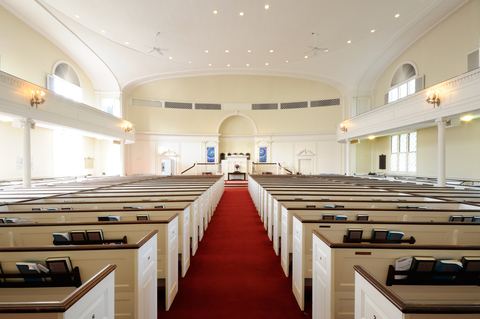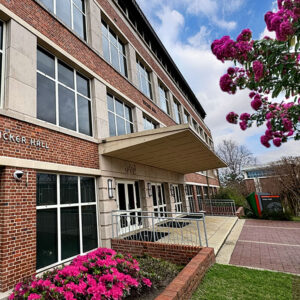News | March 21st, 2020
Faith Amidst The Pandemic
By: Mia Uzzell

The world is at a standstill.
Streets from Italy to New York, known for their bustling nature, are eerily desolate. Overwhelmed hospitals are tasked with the cumbersome selection of who is administered healthcare. Grocery stores have turned into a hoarding resort, leaving ransacked aisles. The doors of jobs and schools are abruptly closing across the globe.
Mirroring the plot of a dystopian film, the widespread COVID-19, or coronavirus, pandemic has contorted curfews, self-isolation, and restrictive movement into our new normal.
As the nation copes with the drastic transition, many look to their faith to find a glimpse of solace while facing the unknown. Whether underneath the lurid stained glass windows of the church or the Ark of the synagogue, worshippers have encountered a novel pandemic of their own: empty pulpits.
This past Sunday, the CDC announced an official recommendation to halt all gatherings that require 50 or more people for the upcoming eight weeks. Shortly after the release of the agency’s guidelines, during a White House news conference, President Trump recommended an even more restrictive instruction of avoiding aggregating in groups of more than 10.
Places of worship began to cancel Sabbath and weekday services before these national guidelines, but the recent recommendations have officially sealed many doors shut indefinitely. In an effort to flatten the proverbial curve, live stream services have supplanted face-to-face services.
For many college students and millennials, opting out of traditional services in favor of the digital option is normal. To them, the sheer convenience of receiving sermons through the screens of their television or laptop feels just as tangible as sitting in a wooden pew amongst the congregation. But, for pious churchgoers of the Christian faith, not holding service is a heated point of contention.
William Bell, a FAMU student and minister of the gospel, understands the precautionary measures that churches have enacted but believes gathering in turmoil is an ultimate testament to one’s faith.
“I believe canceling services is an act to protect the larger body of people and their member’s health, but the church that was built on preaching faith, hope, and trust in God. We should be true and living examples of what we teach every Sunday now that our faith is being tested,” said Bell.
Some churches that have refused to close their doors have been lambasted for negligence, but Bell begs to differ. Through the lens of this minister, the Bible’s clear instruction to not operate in a spirit of fear is an indispensable command to heed to at this time.
“I believe the churches that have refused to close their doors are the bodies of Christ that are unafraid of the issues of the world, and they know that God has first, and the last say,” said the junior Psychology student.
At his church home in Tampa, New Mount Zion Missionary Baptist, services were still underway this past Sunday and Bell was sure to be in attendance. He observed that congregants packed the chapel the same, but corresponding with the dire necessity to limit contact, handshaking was urged against and members who develop symptoms over the next weeks were asked to remain home.
Regardless of wanting to remain fervent in their worship, Bell still wants those in attendance to be vigilant in their safety practices. While some church homes remain open, cautioned interactions are bound to occur as the elderly congregation remains exceptionally vulnerable.
“We have to realize the intensity of this pandemic, use common sense, and practice the safe habits the CDC recommended,” he said.
As healthcare professionals hastily grapple to understand the future ramifications of the pandemic within their industry, they are simultaneously pleading the nation to practice social distancing, especially as asymptomatic individuals unknowingly endanger others.
Fellowshipping with other believers is a tenet of Christianity as unwavering faith is said to form through leaning on an equally yoked body of Christ. Dr. Tra’Chella Johnson Foy, however, believes the idea of face-to-face fellowship hinders the curtailing of the virus’ spread.
“Specifically in church services, the closeness of the neighbor is something that is frequently embraced,” said the board-certified physician. “Things like ‘hug your neighbor,’ ‘grab your neighbor’s hands’ are often directives given from the pulpit. These simple things can absolutely jeopardize public health and safety.”
Johnson Foy’s remarks aren’t far-fetched in the slightest. On a global scale, South Korea has already experienced how church services catapulted the spread of COVID-19.
According to Reuters news agency, in late January, South Korea confirmed its first COVID-19 patient, but remarkably maintained their outbreak and kept their case numbers and transfer contacts low. After time progressed, a surge blindsided the country’s efforts in mid-February.
Reuters unveiled the cause of the upwards jolt in confirmed cases as “Patient 31.” The said patient’s daily commutes, prior to diagnosis, were traced and interactions with densely populated areas were identified.
Patient 31 attended two consecutive two-hour church services at the Shincheonji Church of Jesus where 9,300 people were in attendance. This particular area of prolonged interaction struck the interest of the Korean Centers for Disease Control & Prevention.
Once a list of all attendees was obtained and contacted, approximately 1,200 individuals complained of flu-like symptoms. Of this cohort, KCDC has confirmed roughly 1,000 cases and the church has been rendered as the main cluster of cases across the country.
Reports like these heighten Johnson Foy’s apprehension towards the welfare of those who are still moved to attend church, but as a Christian woman, she also understands the economic implications at hand.
Though no place of worship is seen as a stakeholder in the economy, the rumors of an oncoming recession are portents that even the church will undoubtedly take a financial hit in the near future.
“I would also be remiss if I didn’t point out the economic side of this. Many churches rely on the tithes and offerings that are essential to in person fellowships. There is a potential concern that parishioners may not feel the same drive and incentive to give virtual offerings even if the technology exists,” said Johnson Foy.
With an intensifying urgency to decrease the spread of the virus, churchgoers are faced with choosing at-home worshipping or seeking refuge in person.






